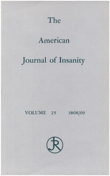Clinical and phenomenological comparisons of late-onset and early-onset depression
Abstract
OBJECTIVE: The authors examined the relationship between age at onset of first depressive episode and clinical features in elderly depressed patients. METHOD: They used data on age at onset and clinical features in 246 elderly depressed patients treated at the National Institute of Mental Health Clinical Research Center for the Study of Depression in Later Life, located at Duke University. RESULTS: Two variables--loss of interest and number of depressive episodes--were related to age at onset in all analyses. CONCLUSIONS: This study confirms the hypothesis that apathy is more prominent in late-onset than in early-onset depression.
Access content
To read the fulltext, please use one of the options below to sign in or purchase access.- Personal login
- Institutional Login
- Sign in via OpenAthens
- Register for access
-
Please login/register if you wish to pair your device and check access availability.
Not a subscriber?
PsychiatryOnline subscription options offer access to the DSM-5 library, books, journals, CME, and patient resources. This all-in-one virtual library provides psychiatrists and mental health professionals with key resources for diagnosis, treatment, research, and professional development.
Need more help? PsychiatryOnline Customer Service may be reached by emailing [email protected] or by calling 800-368-5777 (in the U.S.) or 703-907-7322 (outside the U.S.).



